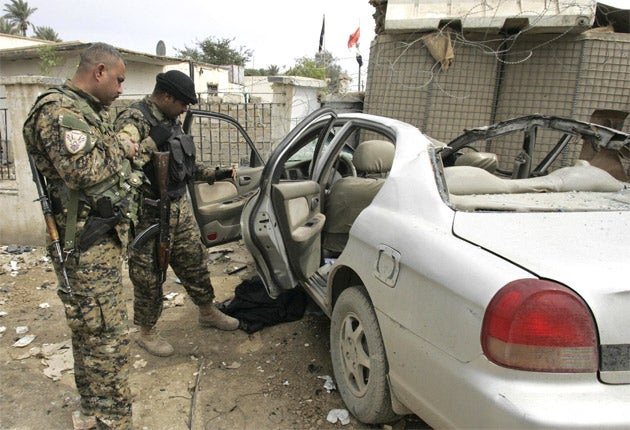Bomber poses as patient to attack hospital
32 die and scores injured in Baquba attacks aimed at destabilising Iraq on eve of elections

Your support helps us to tell the story
From reproductive rights to climate change to Big Tech, The Independent is on the ground when the story is developing. Whether it's investigating the financials of Elon Musk's pro-Trump PAC or producing our latest documentary, 'The A Word', which shines a light on the American women fighting for reproductive rights, we know how important it is to parse out the facts from the messaging.
At such a critical moment in US history, we need reporters on the ground. Your donation allows us to keep sending journalists to speak to both sides of the story.
The Independent is trusted by Americans across the entire political spectrum. And unlike many other quality news outlets, we choose not to lock Americans out of our reporting and analysis with paywalls. We believe quality journalism should be available to everyone, paid for by those who can afford it.
Your support makes all the difference.Three suicide bombers, including one who sneaked his explosives into a hospital, killed at least 32 people yesterday in a former insurgent stronghold north east of Baghdad, sending a deadly signal ahead of Iraq's elections at the weekend.
Deputy Interior Minister Iden Khalid said at a news conference afterwards that security forces expect further attacks, but they will not interfere with Sunday's vote.
The blasts struck Baquba in quick succession, starting with a suicide car bomb that targeted a local government housing office near an Iraqi army facility, police spokesman Captain Ghalib al-Karkhi said.
Within minutes, a second suicide car bomb exploded 200 yards down the street near the provincial government headquarters near many police and army personnel.
It was the final bomber, however, who caused the most casualties, by donning a military uniform, pretending to be wounded and riding an ambulance back to the hospital where he blew himself up, said Capt Karkhi, killing many of the wounded from the first two bombs. Police later safely detonated a fourth car bomb about 200m from the hospital.
Insurgents often carry out multiple bomb attacks to maximise damage as rescuers and others rush to the scene to help those affected.
The blasts come before of Sunday's crucial ballot to decide who will oversee the country as coalition forces go home. At stake is whether Iraq can overcome the deep sectarian tensions that have divided the nation since the 2003 US-led invasion.
US and Iraqi officials warned of a possible rise in violence ahead of the weekend as insurgents seek to disrupt elections. A message last month, purporting to be from the leader of al-Qa'ida in Iraq, promised just that.
No group immediately claimed responsibility for the bombings, but such attacks have been the hallmark of al-Qa'ida in Iraq. Police said they arrested four suspects and imposed an open-ended curfew on the city as they search for more suspects.
Mahmoud Fadil, 50, said he was heading to the electric company office when he heard an explosion and was thrown through the air.
"I saw others covered with blood lying on the ground and some crying because of wounds caused by shrapnel and the huge blast," he said.
Fakhri al-Obaidi, spokesman of the Diyala provincial council, said the bombings reflected a "major security failure", shattering a period of relative calm in the province that was once a byword for savage sectarian fighting.
"These attacks aim to terrify people from going to polling stations, but I am sure that people will insist on voting," he said.
Wednesday's bombings were the deadliest since the start of February, when a female suicide bomber blew herself up at a way station for Shiite pilgrims in Diyala, killing 54 people. At the time, Baghdad's top security official said extremists were adopting new methods to outwit bomb-detection squads such as stashing explosives deep inside the engines and frames of vehicles.
Iraqi authorities have vowed tight security in the capital and the rest of the country in the run-up to the election and on voting day. Generally a vehicle ban is imposed across Iraq, the airport will be shut down and hundreds of thousands of police and army troops will be deployed across the country.
Subscribe to Independent Premium to bookmark this article
Want to bookmark your favourite articles and stories to read or reference later? Start your Independent Premium subscription today.
Join our commenting forum
Join thought-provoking conversations, follow other Independent readers and see their replies
Comments